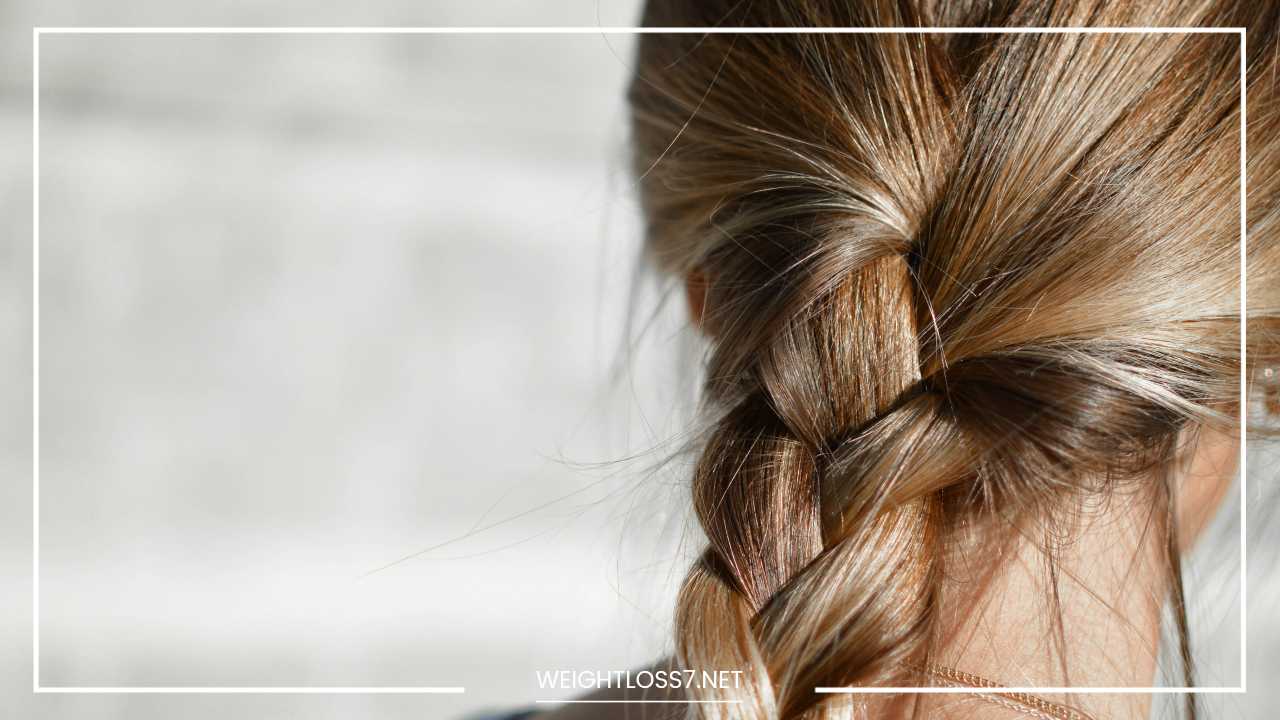Healthy Hair Vitamins: Nourishing Your Locks from Within

Healthy Hair Vitamins
Healthy Hair Vitamins: Nourishing Your Locks from Within (An In-Depth Guide)
Longing for lustrous, bouncy hair that turns heads? You’re not alone. Hair health is a complex equation influenced by genetics, hormones, stress, and most importantly, diet.
But fear not, fellow hair enthusiasts! Healthy hair vitamins can be a powerful weapon in your arsenal, providing the internal nourishment your locks crave.
The Science of Hair Growth
Hair may seem like an inanimate accessory, but it’s a dynamic biological marvel. Each strand is meticulously crafted by hair follicles nestled within the scalp.
These follicles are like tiny factories, churning out keratin – the protein that forms the building blocks of hair.
Fueling this production line requires a steady supply of vitamins, minerals, and amino acids. A deficiency in any of these essential components can disrupt the delicate hair growth cycle, leading to problems like:
- Hair Loss: This can manifest in various ways, from gradual thinning to sudden patches of baldness.
- Dryness and Brittleness: Hair that lacks proper hydration becomes dull, prone to breakage, and loses its natural shine.
- Slow Growth: If the hair follicles aren’t receiving the nutrients they need, hair growth can become sluggish, leaving you frustrated with short, wispy strands.
Essential Nutrients for Healthy Hair
A well-rounded diet is the cornerstone of healthy hair. But sometimes, our modern lifestyles and dietary choices leave us with nutrient gaps.
Here’s where targeted hair vitamins can bridge the gap and provide the specific nourishment your hair craves:
- The B-Team (Biotin, B12, Folate): These B vitamins are the rockstars of cell metabolism, a crucial process for hair growth. Biotin, in particular, has garnered significant attention for its potential to strengthen hair and promote thickness.
- Vitamin A: Imagine Vitamin A as the scalp’s personal trainer. It helps maintain a healthy scalp environment and stimulates sebum production, keeping your hair naturally moisturized. However, moderation is key; excessive intake can lead to hair loss.
- Vitamin C: This antioxidant warrior shields hair from free radical damage, the environmental gremlins that wreak havoc on your strands. Additionally, Vitamin C aids in iron absorption, another essential mineral for healthy hair.
- Vitamin D: Sunlight might not be the only source of Vitamin D deficiency blues. Research suggests a link between low Vitamin D levels and hair loss. This vitamin plays a role in regulating cell growth and may promote hair follicle activity.
- Vitamin E: Another antioxidant powerhouse, Vitamin E improves blood circulation to the scalp, potentially enhancing hair growth by delivering essential nutrients directly to the hair follicles.
- Iron: Iron deficiency is a common culprit behind hair loss, especially in women. This mineral carries oxygen throughout the body, nourishing hair follicles and promoting healthy hair growth.
- Zinc: Think of zinc as the construction worker of hair health. It plays a vital role in protein synthesis and cell division, both of which are essential for building strong, healthy hair.
Are Hair Vitamins Right for You?
Hair vitamins can be a valuable tool, but they’re not a one-size-fits-all solution. Here’s how to determine if they can benefit your specific needs:
- Hair Loss: Experiencing thinning hair, sudden bald patches, or excessive shedding? This could indicate deficiencies in iron, zinc, biotin, or Vitamin D.
- Dry and Brittle Hair: If your hair feels straw-like and breaks easily, you might be lacking essential fatty acids, Vitamin A, or Vitamin E.
- Slow Hair Growth: Frustrated with hair that seems stuck in a short phase? Deficiencies in B vitamins, Vitamin D, or iron can hinder hair growth.
Before You Pop a Pill: Consulting Your Doctor
Remember, hair vitamins are supplements, not replacements. Always consult your doctor before starting any new supplement regimen.
They can assess your individual needs, identify any underlying causes of hair problems, and recommend the appropriate dosage to avoid potential side effects. Additionally, some medications can interact with certain vitamins, so be transparent with your doctor about any current medications you’re taking.
Demystifying the Hair Vitamin Aisle: Choosing the Right Formula
The world of hair vitamins can be daunting, with countless brands vying for your attention. Here are some tips to navigate this crowded space:
- Brand Reputation Matters: Choose established brands with a proven track record of quality and adherence to strict manufacturing standards.
- Target Your Needs: Are you looking for a general hair health booster, or do you have a specific concern like hair loss? Look for formulas designed to address your specific needs. Don’t be swayed by generic “hair, skin, and nails” formulas if your primary focus is hair health.
- Label Literacy: Scrutinize the label carefully. Ensure the vitamin contains the right combination and dosage of nutrients for your needs. Look for key ingredients mentioned earlier and avoid formulas with fillers, artificial colors, or unnecessary additives.
- Beware of Exaggerated Claims: If a supplement promises overnight hair growth that rivals Rapunzel’s, it’s likely too good to be true. Steer clear of products with unrealistic claims and focus on formulas backed by scientific evidence.
- Form Matters: Some vitamins come in capsules, gummies, or even liquid form. Choose a format that suits your preference and ensures optimal absorption. For instance, some studies suggest that biotin might be better absorbed in liquid form.
Beyond the Bottle: Natural Ways to Nourish Your Hair
Hair vitamins are a helpful tool, but they shouldn’t overshadow the importance of a healthy diet. Here’s how to nourish your hair from the inside out:
- Eat a Rainbow: Fill your plate with a vibrant array of fruits and vegetables. These powerhouses are packed with essential vitamins, minerals, and antioxidants that support healthy hair growth.
- Don’t Skimp on Protein: Hair is primarily composed of protein, so ensure your diet includes adequate protein sources like lean meats, fish, eggs, legumes, and nuts.
- Embrace Healthy Fats: Don’t demonize all fats! Healthy fats, particularly omega-3 fatty acids found in fatty fish, nuts, and seeds, promote scalp health and contribute to luscious locks. Think salmon, walnuts, and flaxseeds for a hair-boosting dose.
- Stay Hydrated: Water is the elixir of life, and it’s crucial for healthy hair too. Drinking plenty of water keeps your scalp hydrated and prevents dryness, promoting overall hair health.
Lifestyle Habits for Hair Happiness
Diet and supplements are key components, but a holistic approach is essential for optimal hair health. Here are some lifestyle habits that can significantly impact your hair’s well-being:
- Manage Stress: Chronic stress can disrupt the hair growth cycle and lead to hair loss. Practice stress-management techniques like yoga, meditation, or deep breathing to keep your cortisol levels in check.
- Prioritize Sleep: While you slumber, your body repairs and rebuilds tissues, including hair follicles. Aim for 7-8 hours of quality sleep each night to allow your hair to thrive.
- Heat Styling with Caution: We all love a good blowout, but excessive heat styling can damage hair. Limit the use of hot tools and opt for lower heat settings whenever possible. Consider heat protectant sprays to minimize heat damage.
- Gentle Hair Care: Treat your hair with kindness! Use a shampoo and conditioner suitable for your hair type. Avoid harsh styling products that can strip away natural oils and leave hair dry and brittle. Brushing gently and detangling knots before shampooing can also help minimize breakage.
Embracing a Multifaceted Approach
Healthy hair vitamins can be a valuable tool in your hair care arsenal, but they’re not a magic bullet. Remember, a balanced diet, healthy lifestyle habits, and proper hair care are all crucial for achieving your hair goals.
Consult your doctor to determine if hair vitamins are right for you and work together to create a personalized plan that nourishes your hair from the inside out.
With dedication and the right approach, you can unlock the secrets to healthy, vibrant hair that will turn heads for all the right reasons.
Bonus: Exploring Alternative and Complementary Therapies
While scientific research on their effectiveness is ongoing, some people find alternative and complementary therapies beneficial for hair health. Here are a few examples:
- Scalp Massage: A gentle scalp massage can improve blood circulation to the scalp, potentially promoting hair growth.
- Essential Oils: Certain essential oils like rosemary and peppermint are believed to stimulate hair follicles, although more research is needed. Always dilute essential oils with a carrier oil before topical application and consult a healthcare professional before use.
- Scalp Treatments: Some dermatologists offer scalp treatments with ingredients like minoxidil or platelet-rich plasma (PRP) to address hair loss.
Remember, it’s crucial to discuss any alternative therapies with your doctor before trying them, especially if you have any underlying health conditions.
The journey to healthy hair is a multi-faceted one. By combining a balanced diet, healthy lifestyle choices, proper hair care, and potentially incorporating hair vitamins, you can create a holistic approach that nourishes your hair from within and out.
With dedication and the right approach, you can unlock the secrets to luscious, healthy hair that reflects your inner beauty and radiates confidence.
Hair Health Glossary
Understanding the terminology associated with hair health can empower you to make informed decisions about your hair care routine. Here’s a quick glossary to decode some key terms:
- Alopecia: The medical term for hair loss.
- Anagen Phase: The active growth phase of the hair follicle, lasting 2-7 years.
- Catagen Phase: The transitional phase between growth and resting, lasting a few weeks.
- Telogen Phase: The resting phase of the hair follicle, lasting about 3 months, before the hair sheds and a new one begins to grow.
- Dermatologist: A doctor specializing in skin, hair, and nail conditions.
- Follicle: The tiny pocket in the scalp where hair grows.
- Keratin: The protein that forms the primary structural component of hair.
- Scalp Microbiome: The community of microorganisms living on the scalp, which plays a role in scalp health.
- Sebum: An oily substance produced by the sebaceous glands in the scalp that helps keep hair moisturized.
Common Hair Loss Concerns and Potential Causes
Hair loss is a prevalent concern, affecting both men and women. Here’s a breakdown of some common types of hair loss and their potential causes:
- Androgenetic Alopecia (Pattern Baldness): This hereditary condition is the most common cause of hair loss in both men and women. In men, it usually manifests as a receding hairline or thinning at the crown. In women, it often presents as overall hair thinning.
- Telogen Effluvium: This temporary form of hair loss can be triggered by various factors like stress, illness, significant weight loss, childbirth, or certain medications.
- Alopecia Areata: This autoimmune disorder causes patchy hair loss on the scalp and sometimes other body areas.
- Traction Alopecia: This type of hair loss results from repeated pulling or tension on the hair, often caused by tight hairstyles like braids or ponytails.
It’s important to note that this is not an exhaustive list, and hair loss can have various causes. If you’re experiencing hair loss, consult a dermatologist to determine the underlying cause and explore treatment options.
Maintaining Healthy Hair: Long-Term Strategies
Achieving healthy hair is a marathon, not a sprint. Here are some long-term strategies to keep your hair looking and feeling its best:
- Consistency is Key: Consistency is crucial for both your hair care routine and dietary choices. Aim for a balanced diet rich in essential nutrients and stick to a gentle hair care regimen that works for your hair type.
- Sun Protection: Just like your skin, your hair needs protection from the sun’s harmful UV rays. Wear hats or use hair products with SPF when spending time outdoors.
- Regular Trims: Split ends can travel up the hair shaft, making hair appear dry and damaged. Split end trims every 6-8 weeks can help maintain healthy hair.
- Embrace Silk or Satin Pillowcases: Cotton pillowcases can be abrasive on hair, causing friction and breakage. Opt for silk or satin pillowcases that reduce friction and help hair retain moisture.
Remember, healthy hair is a reflection of overall health. By prioritizing your well-being, eating a balanced diet, managing stress, and getting enough sleep, you’ll be well on your way to achieving hair that is not only beautiful but also a testament to your inner health.

















